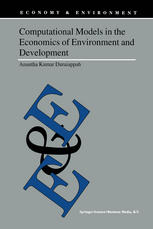

Most ebook files are in PDF format, so you can easily read them using various software such as Foxit Reader or directly on the Google Chrome browser.
Some ebook files are released by publishers in other formats such as .awz, .mobi, .epub, .fb2, etc. You may need to install specific software to read these formats on mobile/PC, such as Calibre.
Please read the tutorial at this link: https://ebookbell.com/faq
We offer FREE conversion to the popular formats you request; however, this may take some time. Therefore, right after payment, please email us, and we will try to provide the service as quickly as possible.
For some exceptional file formats or broken links (if any), please refrain from opening any disputes. Instead, email us first, and we will try to assist within a maximum of 6 hours.
EbookBell Team

4.0
76 reviewsComputational Models in the Economics of Environment and Development provides a step-by-step guide in designing, developing, and solving non-linear environment-development models. It accomplishes this by focusing on applied models, using real examples as case studies. Additionally, it gives examples of developing policy interventions based on quantitative model results. Finally, it uses a simple computer program, GAMS, to develop and solve models.
This book is targeted towards university lecturers and students in economic modeling and sustainable development, but is also of particular interest to researchers at sustainable development research institutes and policy makers at international sustainable development policy institutions such the World Bank, UNDP, and UNEP.